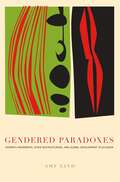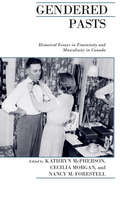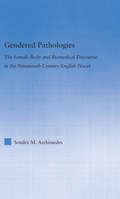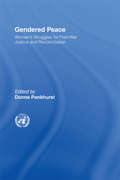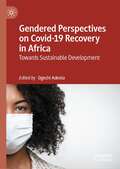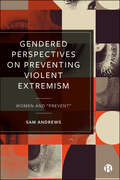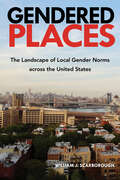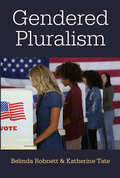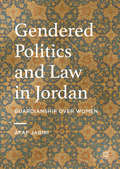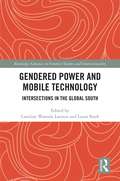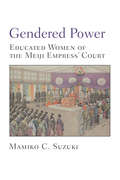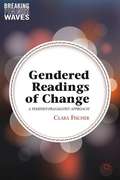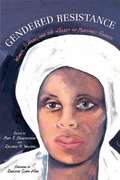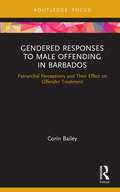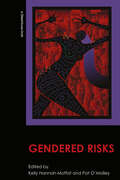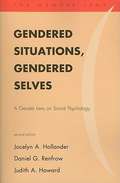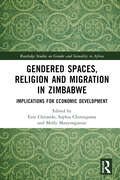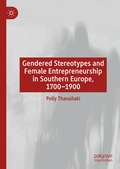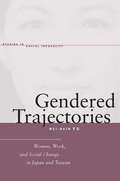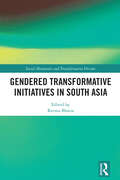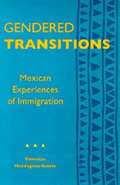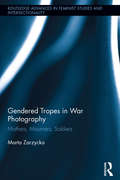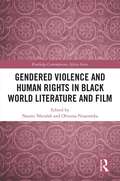- Table View
- List View
Gendered Paradoxes: Women's Movements, State Restructuring, and Global Development in Ecuador (G - Reference, Information and Interdisciplinary Subjects)
by Amy LindSince the early 1980s Ecuador has experienced a series of events unparalleled in its history. Its “free market” strategies exacerbated the debt crisis, and in response new forms of social movement organizing arose among the country’s poor, including women’s groups. Gendered Paradoxes focuses on women’s participation in the political and economic restructuring process of the past twenty-five years, showing how in their daily struggle for survival Ecuadorian women have both reinforced and embraced the neoliberal model yet also challenged its exclusionary nature. Drawing on her extensive ethnographic fieldwork and employing an approach combining political economy and cultural politics, Amy Lind charts the growth of several strands of women’s activism and identifies how they have helped redefine, often in contradictory ways, the real and imagined boundaries of neoliberal development discourse and practice. In her analysis of this ambivalent and “unfinished” cultural project of modernity in the Andes, she examines state policies and their effects on women of various social sectors; women’s community development initiatives and responses to the debt crisis; and the roles played by feminist “issue networks” in reshaping national and international policy agendas in Ecuador and in developing a transnationally influenced, locally based feminist movement.
Gendered Pasts
by Nancy Forestell Cecilia Morgan Kathryn McphersonIt is commonplace today to suggest that gender is socially constructed, that the roles women and men fulfill in their daily lives have been created and defined for them by society and social institutions. But how have men and women negotiated and navigated the gender roles that have been thrust upon them? With Gendered Pasts, Kathryn McPherson, Cecilia Morgan, and Nancy M. Forestell have collected eleven engaging essays that seek to answer this question in a wide-ranging exploration of specific gendered dimensions of nineteenth- and twentieth-century Canadian history.The contributors cover all manner of topics related to gender and history across Canada, including: female vagrancy; gambling, drinking, and sex; the role of the miner's wife; the portrayal of gay men; and the sharply defined role of nurses. Unusual in its breadth, Gendered Pasts is essential to the understanding of the various threads and themes in Canadian gender history.Previously published by Oxford University Press.
Gendered Pathologies: The Female Body and Biomedical Discourse in the Nineteenth-Century English Novel (Literary Criticism and Cultural Theory)
by Sondra ArchimedesGendered Pathologies examines nineteenth-century literary representations of the pathologized female body in relation to biomedical discourses about gender and society in Victorian England. According to medical and scientific views of the period, the woman who did not conform to the dictates of gender ideology was, biologically speaking, aberrant: a deviation from the norm. Yet, although marginalized in a social sense, the "deviant" woman was central as a literary and cultural trope. Analyzing novels by Charles Dickens, H. Rider Haggard, and Thomas Hardy alongside Foucault's notion of perverse sexualities and Herbert Spencer's model of the social organism, Archimedes argues that the pathologized female body displaces or resolves, on a narrative level, larger cultural anxieties about the health of the British as a species. While earlier feminist investigations asserted that bourgeois ideology helped to construct scientific discourses about female sexuality and social behavior, this study takes these assertions as a starting point . Examining incest, racial stereotyping, and neurasthenia, Gendered Pathologies attempts to shed light on the ways in which biological thinking permeated British culture in the second half of the nineteenth century.
Gendered Peace: Women's Struggles for Post-War Justice and Reconciliation (Routledge/UNRISD Research in Gender and Development)
by Donna PankhurstThis volume contributes to the growing literature on women, conflict and peacebuilding by focusing on the moments after a peace accord, or some other official ending of a conflict, often denoted as ‘post-conflict’ or ‘post-war’. Such moments often herald great hope for holding to account those who committed grave wrongs during the conflict, and for a better life in the future. For many women, both of these hopes are often very quickly shattered in starkly different ways to the hopes of men. Such periods are often characterized by violence and insecurities, and the official ending of a war often fails to bring freedom from sexual violence for many women. Within such a context, efforts on the part of women, and those made on their behalf, to hold to account those who commit crimes against them, and to access their rights are difficult to make, are often dangerous, and are also often deployed with little effect. Gendered Peace explores international contexts, and a variety of local ones, in which such struggles take place, and evaluates their progress. The volume highlights the surprising success in the development of international legal advances for women, but contrasts this with the actual experience of women in cases from Sierra Leone, Rwanda, South Africa, Afghanistan, Bangladesh, East Timor, Peru, Central America and the Balkans.'
Gendered Perspectives on Covid-19 Recovery in Africa: Towards Sustainable Development
by Ogechi AdeolaThis book describes the political, social, and economic connections between gender and the Covid-19 pandemic. The authors offer innovative ideas for recovery that will build a more prosperous, healthy, equitable, and sustainable future for African women and girls, targets identified under Goal 5 (Gender Equality and Women’s Empowerment) of the United Nations’ Sustainable Development Goals slated to be achieved by 2030. Within this context, authors identify issues related to the protection of women and girls from poverty, hunger, and gender-based violence; improved healthcare and healthcare workforce experiences; girl-child education; financial inclusion; and entrepreneurship opportunities for women in fintech, tourism, and information, communication and technology (ICT). The book concludes with a discussion of economic empowerment for women that focuses on normalising the ‘un-normal’ outcome of the pandemic. The book will be of value to policymakers, non-profit organisations, practitioners, and scholars who understand the importance of gender equality and women empowerment in the African continent.
Gendered Perspectives on Preventing Violent Extremism: Women and 'Prevent'
by Sam AndrewsThe UK’s ‘Prevent’ strategy aims to dissuade vulnerable groups from supporting terrorism, and women have been involved since its inception in 2006. Sam Andrews argues that women are still viewed within a traditional gendered framework as primarily peaceful and are mostly engaged as mothers, enlisted by Prevent to watch over and guide their families and communities. Drawing on interviews and case studies, this book reveals how Prevent goes beyond simple counter-terrorism messaging to fund a diverse array of projects, from support for victims of domestic violence to parenting courses, shaping wider engagement with women in society.
Gendered Places: The Landscape of Local Gender Norms across the United States
by William J. ScarboroughEvery place has its quirky attributes, cultural reputation, and distinctive flair. But when we travel across America, do we also experience distinct gender norms and expectations? In his groundbreaking Gendered Places, William Scarborough examines metropolitan commuting zones to see how each region’s local culture reflects gender roles and gender equity. He uses surveys and social media data to measure multiple dimensions of gender norms, including expectations toward women in leadership, attitudes toward working mothers, as well as the division of household labor. Gendered Places reveals that different locations, even within the same region of the country, such as Milwaukee and Madison Wisconsin, have distinct gender norms and highly influential cultural environments. Scarboroughshows how these local norms shape the attitudes and behaviors of residents with implications on patterns of inequality such as the gender wage gap. His findings offer valuable insight for community leaders and organizers making efforts to promote equality in their region. Scarboroughrecognizes local culture as not value-neutral, but highly crucial to the gender structure that perpetuates, or challenges, gender inequality. Gendered Places questions how these gender norms are sustained and their social consequences.
Gendered Places: The Landscape of Local Gender Norms across the United States
by William J. ScarboroughEvery place has its quirky attributes, cultural reputation, and distinctive flair. But when we travel across America, do we also experience distinct gender norms and expectations? In his groundbreaking Gendered Places, William Scarborough examines metropolitan commuting zones to see how each region’s local culture reflects gender roles and gender equity. He uses surveys and social media data to measure multiple dimensions of gender norms, including expectations toward women in leadership, attitudes toward working mothers, as well as the division of household labor. Gendered Places reveals that different locations, even within the same region of the country, such as Milwaukee and Madison Wisconsin, have distinct gender norms and highly influential cultural environments. Scarboroughshows how these local norms shape the attitudes and behaviors of residents with implications on patterns of inequality such as the gender wage gap. His findings offer valuable insight for community leaders and organizers making efforts to promote equality in their region. Scarboroughrecognizes local culture as not value-neutral, but highly crucial to the gender structure that perpetuates, or challenges, gender inequality. Gendered Places questions how these gender norms are sustained and their social consequences.
Gendered Pluralism (The Cawp Series In Gender And American Politics)
by Katherine Tate Belinda RobnettFocused on structural and political intersectionalities, Gendered Pluralism takes a broader approach to understanding the constellation of factors that drive gender and racial differences on an array of public policy issues. Belinda Robnett and Katherine Tate examine a broader set of actors absent the contextual factors that may drive them to compromise their opinions. Their study examines the ways in which (1) men and women differ on public policy issues and the factors that drive these differences; (2) whites and racial-ethnic minorities differ on public policy issues and the factors that drive these differences; (3) women differ on public policy issues and the factors that drive these differences; (4) African-American men and women differ on public policy issues and the factors that drive these differences; and (5) African-American women differ on public policy issues and the factors that drive these differences.
Gendered Politics and Law in Jordan
by Afaf JabiriThis book analyzes how the state constructs and reproduces gender identities in the context and geopolitics of Jordan. It addresses the relevance of the state and its web of relations in understanding the politics of gender in the Middle East, rather than a cultural or religious explanation for women's subjugation. Guardianship over women is examined as not only the basis of women's legal and social subordination, but also a key factor in the construction and reproduction of a gender hierarchy system. The author probes how a masculine state gives power and legitimacy through guardianship to institutions-including family, religion, and tribe-in managing, producing, and constructing gender identity. Does the masculine institution succeed in imposing a dominant form of femininity? Or are there ways by which women escape and resist the social and legal construction of femininity? Based on over 60 case studies of contemporary women in Jordan, the book additionally examines how the resultant strategies and tactics developed by women in Jordan are influenced by and affect their status within the guardianship system.
Gendered Power and Mobile Technology: Intersections in the Global South (Routledge Advances in Feminist Studies and Intersectionality)
by Laura Stark Caroline Wamala LarssonMobile phones are widely viewed as the information and communication technology that holds the most promise for bridging global digital divides. Gendered Power and Mobile Technology uses empirical research to focus on changing intersections between technology, gender and other categories of social and cultural power difference (such as age, race, class, and ethnicity) in the use of mobile communication technologies. Asking how these intersections can inform development discourse, practice, and research, this volume seeks to rectify the lack of attention to the Global South, calling for more sensitivity to the contexts and consequences of mobile phone use. Indeed, drawing on case studies from Ecuador, Ghana, Kenya, Mexico, Peru, Tanzania, and Uganda, this book engages with the intersectionality paradigm to tease out the complexities of using mobile technologies for development purposes. Gendered Power and Mobile Technology will appeal to students and researchers interested in fields such as media studies, development studies, gender and technology, feminist technoscience, anthropology, and sociology.
Gendered Power: Educated Women of the Meiji Empress' Court (Michigan Monograph Series in Japanese Studies #86)
by Mamiko SuzukiGendered Power sheds light on the sources of power for three prominent women of the Meiji period: Meiji Empress Haruko; public speaker, poet, and diarist Nakajima Shoen; and educator and prolific author Shimoda Utako. By focusing on the role Chinese classics (kanbun) played in the language employed by elite women, the chapters focus on how Empress Haruko, Shoen, and Shimoda Utako contributed new expectations for how women should participate in a modernizing Japan. By being in the public eye, all three women countered criticism of and commentary on their writings and activities, which they parried by navigating gender constraints. The success or failure as women ascribed to these three figures sheds light on the contradictions inhabited by them during a transformative period for Japanese women. By proposing and interrogating the possibility of Meiji women’s power, the book examines contradictions that were symptomatic of their struggles within the vast social, cultural, and political transformations that took place during the period. The book demonstrates that an examination of that conflict within feminist history is crucial in order to understand what radical resistance meant in the face of women-centered authority.
Gendered Readings Of Change
by Clara FischerThis book develops a unique theory of change by drawing on American philosophy and contemporary feminist thought. Via a select history of ancient Greek and Pragmatist philosophies of change, Fischer argues for a reconstruction of transformation that is inclusive of women's experiences and thought.
Gendered Resistance: Women, Slavery, and the Legacy of Margaret Garner
by Darlene Clark Hine Delores M. Walters Mary E. FredericksonInspired by the searing story of Margaret Garner, the escaped slave who in 1856 slit her daughter's throat rather than have her forced back into slavery, the essays in this collection focus on historical and contemporary examples of slavery and women's resistance to oppression from the nineteenth century to the twenty-first. Each chapter uses Garner's example--the real-life narrative behind Toni Morrison's Beloved andthe opera Margaret Garner--as a thematic foundation for an interdisciplinary conversation about gendered resistance in locations including Brazil, Yemen, India, and the United States. Contributors are Nailah Randall Bellinger, Olivia Cousins, Mary E. Frederickson, Cheryl Janifer LaRoche, Carolyn Mazloomi, Cathy McDaniels-Wilson, Catherine Roma, Huda Seif, S. Pearl Sharp, Raquel Luciana de Souza, Jolene Smith, Veta Tucker, Delores M. Walters, Diana Williams, and Kristine Yohe.
Gendered Responses to Male Offending in Barbados: Patriarchal Perceptions and Their Effect on Offender Treatment (Routledge Studies in Crime and Society)
by Corin BaileyIt is generally accepted that men commit more crimes than women. The widespread acceptance of this view is based primarily on the number of convictions with most jurisdictions reporting considerably fewer incarcerated women/girls than men/boys. This manuscript argues however that decisions made by the various stakeholders that play a role in the incarceration of men are inherently gendered. These decisions are based on patriarchal perceptions and stereotypes related to the familial roles of men and women, and by extension their motivations or offending. Few studies have sought to explore the nature of these perceptions, and the effect these may have on incarceration patterns. Indeed, this form of inquiry remains absent from the research agenda of Caribbean criminologists. Using qualitative data from Barbados, this book analyses the extent to which these factors are taken into consideration not only by the police and members of the judiciary, but by examining the gendered decisions made by shop managers and proprietors in cases involving shoplifting, it seeks to analyse the extent to which these factors are taken into consideration before incidents reach the justice system. Critically, this book seeks also to juxtapose these assumptions against testimony from men incarcerated at Her Majesty’s Prison. The large proportion of males in Caribbean prisons when compared to their female counterparts necessitates an investigation into the factors that may contribute to differential treatment as they move through the justice system. Using data from Barbados, the present study seeks to fill this need.
Gendered Risks
by Pat O'Malley Kelly Hannah-MoffatEdited and contributed to by a collection of eminent international scholars in the field, this is the first book to explore the gendered aspects of risk. It analyzes what is currently known and identifies some of the new directions and challenges for research and theory that emerge from thinking of risk as a governmental technique; as a form of consciousness and action and as a political issue, shaped by, and shaping gender in contemporary society.
Gendered Situations, Gendered Selves: A Gender Lens on Social Psychology (Second Edition)
by Judith A. Howard Jocelyn A. Hollander Daniel G. RenfrowThe book examines the basic underpinnings of everyday interaction: from how we think, to who we see ourselves and others to be, to how we interact with others. Each of these processes is based on both social psychology and gender (as differentiated from sex), as well as our racial backgrounds, ethnic heritages, socioeconomic circumstances, sexualities, and national histories. The authors present and critique each of the major theories of social psychology, social exchange, social cognition, and symbolic interaction. In doing so, the book introduces a full array of key concepts in social psychology—perception, stereotyping, attribution, self-presentation, impression management, defining social situations, exchanging resources, and balancing power and dependence in social relations. The book also discusses two fundamental aspects of human behavior—the dynamics of helping and harming. The second edition incorporates discussions of contemporary psychological and sociological research and features powerful new examples, including 9/11 and the election of Barack Obama.
Gendered Spaces in Argentine Women’s Literature
by Marta SierraAddressing the issue of how gendered spatial relations impact the production of literary works, this book discusses gender implications of spatial categories: the notions of home and away, placement and displacement, dwelling and travel, location and dislocation, and the 'quest for place' in women's writing from Argentina from 1920 to the present.
Gendered Spaces, Religion and Migration in Zimbabwe: Implications for Economic Development (Routledge Studies on Gender and Sexuality in Africa)
by Ezra Chitando Sophia Chirongoma Molly ManyonganiseThis book explores the intersections of gender, religion and migration within the context of post-independent Zimbabwe, with a specific focus on how gender disparities impact economic development. By demonstrating how these interconnections impact women’s and girls’ lived realities, the book addresses the need for gender equity, gender inclusion and gender mainstreaming in both religious and societal institutions. The book assesses the gender and migration nexus in Zimbabwe and examines the impact of religio-cultural ideologies on the status of women. In doing so, it assesses the transition of Zimbabwean women across spaces and provides insights into the practical strategies that can be utilised to improve their status both “at home” and “on the move”. Furthermore, chapters show how space continues to be genderised in ways that perpetuate structural inequality to challenge the exclusion of women from key social processes. Contributing to ongoing scholarly debates on gender in Africa, this book will be of interest to academics and students of Gender Studies, Women’s Studies, African Studies, Development Studies as well as advocators of human rights and gender activists.
Gendered Stereotypes and Female Entrepreneurship in Southern Europe, 1700-1900
by Polly ThanailakiThis book addresses issues that remain under-researched by feminist historians. They pertain to female economic contribution in specific geographical areas and countries such as Greece, Italy, a number of regions of France, Greek-speaking regions in the Ottoman-ruled Macedonia, and two countries in the Balkans: Romania and Bulgaria. Additionally, it compares and contrasts female economic agency in the above regions which is a field that hitherto lacks thorough study. Polly Thanailaki explores female contribution to the finances of their family and to the economy of their country and how they interlaced in a transnational historical setting, further exploring social norms and trading practices in these regions. The methodology is based on the study of original printed sources such as archives, newspapers, and journals of the period, along with secondary sources of literature. The book addresses the nexus of gender, economy, and society covering a broad spectrum of gender studies, economic history and social history in time and in geographic space.
Gendered Trajectories
by Wei-Hsin YuGendered Trajectoriesexplores why industrial societies vary in the pace at which they reduce gender inequality and compares changes in women's employment opportunities in Japan and Taiwan over the last half-century. Japan has undergone much less improvement in women's economic status than Taiwan, despite its more advanced economy and greater welfare provisions. The difference is particularly puzzling because the two countries share many institutional practices and values. Drawing on historical trends, survey statistics, and personal interviews with people in both countries, Yu shows how country-specific organizational arrangements and industrial policies affect women's employment. In particular, the conditions faced by Japanese and Taiwanese women in the workplace have a profound effect on their labor force participation at critical points in their lives. Women's lifetime employment decisions in turn shape the divergent trajectories in gender equality. Few studies documenting the development of women's economic lives are based on non-Western societies and even fewer adopt a comparative perspective. This perceptive work demonstrates and underscores the importance of understanding gender inequality as a long-term, dynamic social process.
Gendered Transformative Initiatives in South Asia (Social Movements and Transformative Dissent)
by Reema BhatiaThis volume discusses gendered transformative initiatives in South Asian feminism, discussing gender norms, labour and market participation by women, along with family planning, reproductive rights and initiatives for the social and financial empowerment of women in South Asia.Gender is a part of our everyday lived reality. It has been one of the key structuring principles of social interaction across societies. The context may be specific to a society, but it is also universal since it intertwines with everyone’s lives. This book uses a bricoleur approach to understanding gender as a lived experience. These explorations examine the ways in which gendered identity is negotiated and lived. The volume uses a multi-methodological and multidisciplinary approach to discuss issues around conflict, work, queer identities, intersectionality and single women across Pakistan, Sri Lanka and Bangladesh.Part of the Social Movements and Transformative Dissent series, this volume will be of interest to students and researchers of gender studies, women’s studies, sociology, economics, development studies, political science, cultural studies and South Asian studies.
Gendered Transitions: Mexican Experiences of Immigration
by Pierrette Hondagneu-SoteloThe momentous influx of Mexican undocumented workers into the United States over the last decades has spurred new ways of thinking about immigration. Pierrette Hondagneu-Sotelo's incisive book enlarges our understanding of these recently arrived Americans and uncovers the myriad ways that women and men recreate families and community institutions in a new land. Hondagneu-Sotelo argues that people do not migrate as a result of concerted household strategies, but as a consequence of negotiations often fraught with conflict in families and social networks. Migration and settlement transform long-held ideals and lifestyles. Traditional patterns are reevaluated, and new relationships--often more egalitarian--emerge. Women gain greater personal autonomy and independence as they participate in public life and gain access to both social and economic influence previously beyond their reach. Bringing to life the experiences of undocumented immigrants and delineating the key role of women in newly established communities, Gendered Transitions challenges conventional assumptions about gender and migration. It will be essential reading for demographers, historians, sociologists, and policymakers. "I've opened my eyes. Back there, they say 'no.' You marry, and no, you must stay home. Here, it's different. You marry, and you continue working. Back in Mexico, it's very different. There is very much machismo in those men."--A Mexican woman living in the United States.
Gendered Tropes in War Photography: Mothers, Mourners, Soldiers (Routledge Advances in Feminist Studies and Intersectionality)
by Marta ZarzyckaPhotographic stills of women, appearing in both press coverage and relief campaigns, have long been central to the documentation of war and civil conflict. Images of non-Western women, in particular, regularly function as symbols of the misery and hopelessness of the oppressed. Featured on the front pages of newspapers and in NGO reports, they inform public understandings of war and peace, victims and perpetrators, but within a discourse that often obscures social and political subjectivities. Uniquely, this book deconstructs – in a systematic, gender-sensitive way – the repetitive circulation of certain images of war, conflict and state violence, in order to scrutinize the role of photographic tropes in the globalized visual sphere. Zarzycka builds on feminist theories of representations of war to explore how the concepts of femininity and war secure each other’s intelligibility in photographic practices. This book examines the complex connections between photographic tropes and the individuals and communities they represent, in order to rethink the medium of photography as a discursive and political practice. This book interrogates both the structure and transmission of contemporary encounters with war, violence, and conflict. It will appeal to advanced students and scholars of gender studies, visual studies, media studies, photography theory, cultural anthropology, cultural studies, and trauma and memory studies.
Gendered Violence and Human Rights in Black World Literature and Film (Routledge Contemporary Africa)
by Naomi Nkealah and Obioma NnaemekaThis book investigates how the intersection between gendered violence and human rights is depicted and engaged with in Africana literature and films. The rich and multifarious range of film and literature emanating from Africa and the diaspora provides a fascinating lens through which we can understand the complex consequences of gendered violence on the lives of women, children and minorities. Contributors to this volume examine the many ways in which gendered violence mirrors, expresses, projects and articulates the larger phenomenon of human rights violations in Africa and the African diaspora and how, in turn, the discourse of human rights informs the ways in which we articulate, interrogate, conceptualise and interpret gendered violence in literature and film. The book also shines a light on the linguistic contradictions and ambiguities in the articulation of gendered violence in private spaces and war. This book will be essential reading for scholars, critics, feminists, teachers and students seeking solid grounding in exploring gendered violence and human rights in theory and practice.
